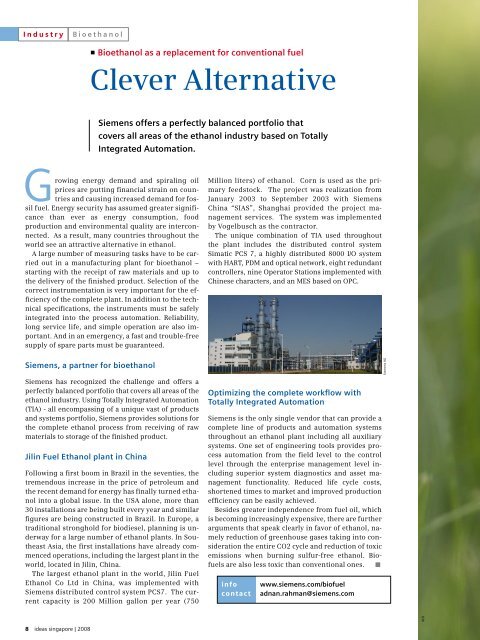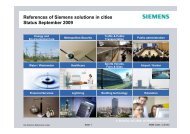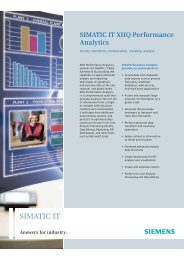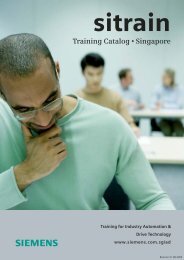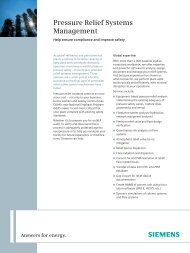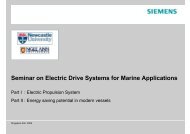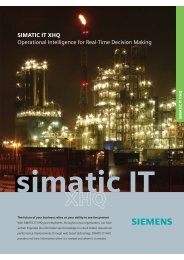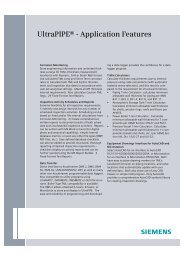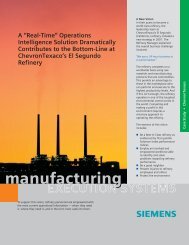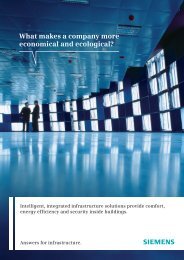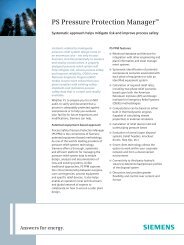Wireless Flexibility - Siemens
Wireless Flexibility - Siemens
Wireless Flexibility - Siemens
Create successful ePaper yourself
Turn your PDF publications into a flip-book with our unique Google optimized e-Paper software.
I n d u s t r y<br />
B i o e t h a n o l<br />
p Bioethanol as a replacement for conventional fuel<br />
Clever Alternative<br />
<strong>Siemens</strong> offers a perfectly balanced portfolio that<br />
covers all areas of the ethanol industry based on Totally<br />
Integrated Automation.<br />
Growing energy demand and spiraling oil<br />
prices are putting financial strain on countries<br />
and causing increased demand for fossil<br />
fuel. Energy security has assumed greater significance<br />
than ever as energy consumption, food<br />
production and environmental quality are interconnected.<br />
As a result, many countries throughout the<br />
world see an attractive alternative in ethanol.<br />
A large number of measuring tasks have to be carried<br />
out in a manufacturing plant for bioethanol –<br />
starting with the receipt of raw materials and up to<br />
the delivery of the finished product. Selection of the<br />
correct instrumentation is very important for the efficiency<br />
of the complete plant. In addition to the technical<br />
specifications, the instruments must be safely<br />
integrated into the process automation. Reliability,<br />
long service life, and simple operation are also important.<br />
And in an emergency, a fast and trouble-free<br />
supply of spare parts must be guaranteed.<br />
Million liters) of ethanol. Corn is used as the primary<br />
feedstock. The project was realization from<br />
January 2003 to September 2003 with <strong>Siemens</strong><br />
China “SIAS”, Shanghai provided the project management<br />
services. The system was implemented<br />
by Vogelbusch as the contractor.<br />
The unique combination of TIA used throughout<br />
the plant includes the distributed control system<br />
Simatic PCS 7, a highly distributed 8000 I/O system<br />
with HART, PDM and optical network, eight redundant<br />
controllers, nine Operator Stations implemented with<br />
Chinese characters, and an MES based on OPC.<br />
<strong>Siemens</strong>, a partner for bioethanol<br />
<strong>Siemens</strong> has recognized the challenge and offers a<br />
perfectly balanced portfolio that covers all areas of the<br />
ethanol industry. Using Totally Integrated Automation<br />
(TIA) - all encompassing of a unique vast of products<br />
and systems portfolio, <strong>Siemens</strong> provides solutions for<br />
the complete ethanol process from receiving of raw<br />
materials to storage of the finished product.<br />
Jilin Fuel Ethanol plant in China<br />
Following a first boom in Brazil in the seventies, the<br />
tremendous increase in the price of petroleum and<br />
the recent demand for energy has finally turned ethanol<br />
into a global issue. In the USA alone, more than<br />
30 installations are being built every year and similar<br />
figures are being constructed in Brazil. In Europe, a<br />
traditional stronghold for biodiesel, planning is underway<br />
for a large number of ethanol plants. In Southeast<br />
Asia, the first installations have already commenced<br />
operations, including the largest plant in the<br />
world, located in Jilin, China.<br />
The largest ethanol plant in the world, Jilin Fuel<br />
Ethanol Co Ltd in China, was implemented with<br />
<strong>Siemens</strong> distributed control system PCS7. The current<br />
capacity is 200 Million gallon per year (750<br />
Optimizing the complete workflow with<br />
Totally Integrated Automation<br />
<strong>Siemens</strong> is the only single vendor that can provide a<br />
complete line of products and automation systems<br />
throughout an ethanol plant including all auxiliary<br />
systems. One set of engineering tools provides process<br />
automation from the field level to the control<br />
level through the enterprise management level including<br />
superior system diagnostics and asset management<br />
functionality. Reduced life cycle costs,<br />
shortened times to market and improved production<br />
efficiency can be easily achieved.<br />
Besides greater independence from fuel oil, which<br />
is becoming increasingly expensive, there are further<br />
arguments that speak clearly in favor of ethanol, namely<br />
reduction of greenhouse gases taking into consideration<br />
the entire CO2 cycle and reduction of toxic<br />
emissions when burning sulfur-free ethanol. Biofuels<br />
are also less toxic than conventional ones. p<br />
info<br />
contact<br />
www.siemens.com/biofuel<br />
adnan.rahman@siemens.com<br />
BED<br />
<strong>Siemens</strong> AG<br />
ideas singapore | 2008


